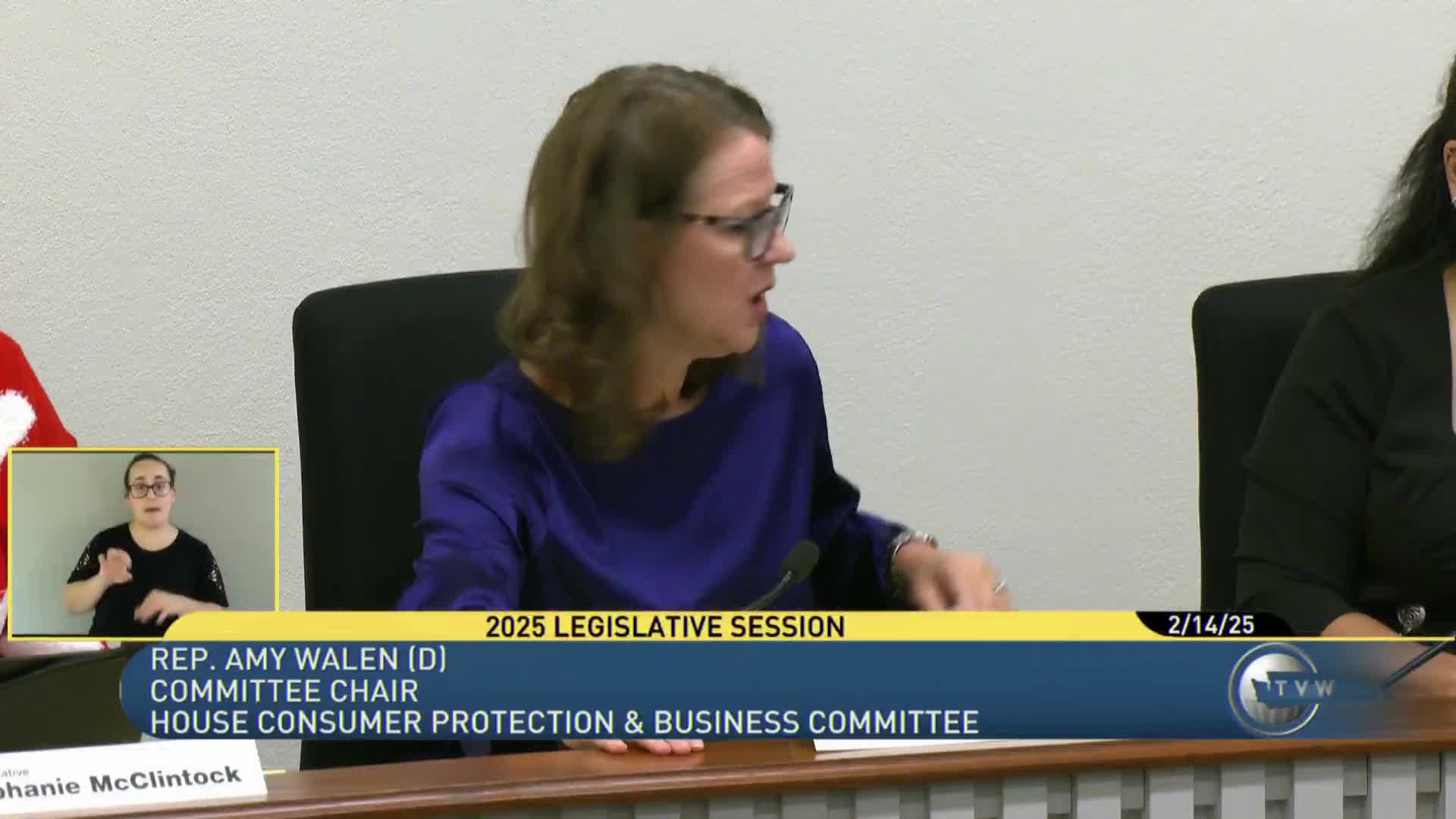House Bill 14-64 would license home-equity-sharing originators; supporters say oversight needed, opponents call product predatory
Get AI-powered insights, summaries, and transcripts
Subscribe
Summary
Staff described HB14-64 as a bill to license and regulate home-equity-sharing agreement (HESA) originators beginning 07/01/2026, with consumer protections such as a three-day cancellation right and a 25% annualized-cost cap.
Committee staff summarized House Bill 14-64 as creating a licensing and regulatory framework for home equity sharing agreement (HESA) originators and imposing a set of consumer protections and prohibitions.
Staff briefing and key elements - Megan Mulvihill, staff to the committee, said the bill would establish a new chapter requiring HESA originators to obtain a license from the Department of Financial Institutions beginning July 1, 2026. Key requirements described by staff include: - A three‑day cancellation right for homeowners. - A homeowner’s beginning home equity must be at least 10%. - Appraisals must meet industry standards and be performed by an independent third-party appraiser unless the homeowner consents to an affiliated appraiser. - A cap on the annualized cost of a HESA of 25%. - A list of prohibited acts (for example, charging an early‑settlement penalty or preventing a homeowner from renting the property). - Record-keeping, reporting requirements and cumulative remedies; violations may also be violations of the state Consumer Protection Act.
Supporters’ testimony - Industry representatives and some HESA providers said licensure and clear rules would weed out bad actors and give consumers a regulated option. Speakers representing Hometap, Unlock Technologies and Point argued the product can be a legitimate alternative for homeowners who are “equity rich and cash poor,” and that codifying consumer protections would reduce harm. - Isaac Castellano (lobbyist; representing Hometap, Unlock and Point) urged support and said the bill ‘‘establishes a strong regulatory framework that recognizes the unique nature of these products while avoiding the challenges and pitfalls of attempting to regulate these unique products.’’ - Josh Gaffney (HomeTap Equity Partners) and Lee Kaplan (Unlock Technologies, general counsel) also advocated for the bill as a way to standardize protections and oversight.
Opponents’ testimony and concerns - Consumer advocates, legal aid organizations and some attorneys urged a no vote. Their primary arguments: - Home equity sharing agreements resemble mortgages in practice and have loss and repayment profiles similar to mortgage loans; three other states that considered HESAs have concluded they are mortgage loans that should be regulated as such. - The 25% annualized cost cap is too high and could still leave homeowners exposed to large costs when a HESA becomes due. - HESAs often target homeowners who are home‑equity rich but cash poor (including elderly homeowners and communities of color); opponents said the bill, as written, is industry-driven and would not sufficiently protect those vulnerable people. - Several opponents described case examples of harm; the committee received written comments and oral testimony urging stronger borrower protections or a rejection of the bill. - Organizations testifying in opposition included the National Consumer Law Center, Northwest Consumer Law Center, Washington State Association for Justice, and Statewide Poverty Action Network.
Balance of arguments - Supporters urged that licensing and specific consumer protections would provide a regulated product and reduce bad actors. Opponents argued that the product’s economic profile means it should be treated under existing mortgage laws and subject to mortgage licensing and protections rather than a separate HESA chapter with a relatively high allowable annualized cost.
Points of procedure and next steps - A number of stakeholders were invited and given constrained testimony time; the committee asked for written comments where speakers could not finish oral testimony. Staff emphasized the DFI licensing approach and listed the statutory consumer protections in the bill as read into the record.
Speakers (selected) - Megan Mulvihill, staff to the committee (staff briefing). First referenced 00:54:44. - Isaac Castellano, contract lobbyist (representing Hometap, Unlock and Point) (support). First referenced 00:57:15. - Josh Gaffney, general counsel, HomeTap Equity Partners (support). First referenced 00:57:46. - Lee Kaplan, general counsel, Unlock Technologies (support). First referenced 00:58:26. - Matt Windsor, Point Digital Finance (support). First referenced 00:59:15. - Andrew Pizer, National Consumer Law Center (opposition). First referenced 00:59:45. - Bridal Donkers, attorney for Crystal Lawrence (opposition). First referenced 01:01:24. - Amanda Martin, Northwest Consumer Law Center (opposition). First referenced 01:02:10. - Molly Gallagher, Statewide Poverty Action Network (opposition). First referenced 01:08:14.
Why the debate matters - Home equity is the principal asset for many lower- and middle-income households. Proponents say HESAs can provide alternatives to high-cost loans or forced sales; opponents insist HESAs often lead to greater long-term loss of homeowner wealth and displacement unless subject to mortgage-style consumer protections.
Ending - The committee heard detailed argument on both sides and closed the public hearing; the measure’s proposed approach (a new licensure and oversight chapter with a 25% cap) drew sharply divergent views. The transcript records extensive requests for written materials and offers from the sponsor and stakeholders to continue negotiations.
